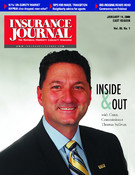Massachusetts independent agents are facing a challenge to hang onto their whopping 86 percent market share in personal lines as the state embarks upon a new competitive auto insurance system that will bring some of the predictive analytics that agents elsewhere have been dealing with for years.
To help agents prepare, the Massachusetts Association of Insurance Agents held a discussion at its annual convention. The following bits of advice are culled from that discussion by these neighboring agents and experts:
Jeff Foy, chief operating officer, Foy Insurance Group, with eight offices and its headquarters in New Hampshire, and three offices in Maine and three in Massachusetts;
Robert Slocum, president, Slocum Insurance Agency, in Warwick, R.I.;
Hal Belodoff, president, Plymouth Rock Assurance Co., and chairman, Palisades Insurance in New Jersey;
Charles Walsh, Boston Software, creators of WinRater, the leading comparative rating software used by Massachusetts agencies; and
Steven J. Aronson, president and CEO, Aronson Insurance, based in Newton, Mass., with another office in Needham.
1. Appreciate that it’s ‘managed’ competition
The restrictions on credit and other rating factors under “managed” competition could mean a more controlled market.
“The term ‘managed’ competition is very interesting to me because in Rhode Island … there is no ‘managed’ competition. It’s flat out everyman for himself. We’re using all the social factors,” Slocum said.
New Hampshire and Maine don’t manage the competition, either. “Every type of socioeconomic factor is used in New Hampshire and Maine. It’s complicated,” Foy said.
But the main advantage of the credit and other restrictions could be that they keep out the GEICOs, State Farms and other big direct writers.
2. Develop an efficient workflow
Handling the additional work to obtain multiple quotes on every risk will be the biggest challenge.
“We represent a lot of carriers, particularly in New Hampshire, and it can sometimes take an hour to rate every single carrier, just to make sure you have the accurate, the best rate that you can offer,” Foy said.
Newton agent Aronson is dreaming for the ideal: a real time solution which would require entering data only once into one system to get back quotes and indications from multiple carriers and even the assigned risk plan in real-time.
Aronson’s scenario represents the ultimate goal, agrees Boston Software’s Walsh, but it won’t happen right away. Instead, the initial emphasis with WinRater will be on getting accurate quotes and simplifying the process as much as possible. “The idea is that you will eventually get to real-time rating … but really what’s gong to happen during this transition period is still being determined,” Walsh said.
3. Push to make real-time a reality
While all agree that real-time rating is the ideal solution, they also agree that it will only happen if independent agents make it happen. Agents need to resist their carriers if they tell them they can’t accept electronic files used by other carriers.
“[Y]ou need to push your companies for real-time rating. You need to make this transition as seamless as possible because the last thing in the world you want to do is to have them telling you to go to our Web site and rate it over there. If you do that and you allow them to do that to you, you will be re-entering data over and over and over again in order to get competitive rates. That is a tremendous drain on your resources and capabilities,” Slocum said.
“Tell them [carriers] they need to work with vendors like us,” Walsh said.
4. Sign up additional auto carriers
Of the 1,700 agencies in Massachusetts, about 900 represent only one auto insurance company. Representing just one or two won’t cut it. Agencies must add carriers so they are able to deliver multiple quotes.
Foy has three offices in Massachusetts and he said he might add three more markets for a total of four — and then he’ll insist his staff quote all four.
Currently Slocum’s smaller agency has about 10 auto carriers. “But we really need them, frankly, to cover the market because the flavor from each of these companies is different. It’s amazing to me that I could have four carriers look at the same risk and the pricing can vary 100 percent,” Slocum said.
Plymouth Rock’s Belodoff also recommends that agencies have multiple carriers “We’re telling our agents that if they just have us or an additional carrier, they might want to consider getting an additional carrier. That’s in their best business interests … because we know we’re not going to have the best price for everybody. Our experience in New Jersey is that with just about four, five maybe six companies, you should be able to come up with a price that is going to beat what the customer’s walking in with…”
5. Negotiate new production requirements
Additional carriers could mean new production requirements. These can range from $500,000 or more in premium to zero, depending on the company.
The good news is that predictive analytics is making production quotas less of an issue. “[W]hat will happen is if I give them a shot every time, they’ll get the business they want. That’s one of the things about predictive analytics is that it’s almost a self-regulating mechanism … because theoretically if they’ve done their math with their magical algorithm the only ones that are going to flow into their bucket are the ones that they want … because the others they’ve priced outside,” Slocum said.
If carriers do insist upon production, agents should insist on input. “There is no set limit; it’s what you negotiate and you have to be prepared to do that,” Foy said.
6. Stress the value of being an independent agent
Agencies should flaunt that they are independent and in a position to offer choice.
“When you approach the consumer you are able to emphasize the fact that you are an independent agent and have looked at multiple companies … that’s extremely powerful. Don’t lose track of that,” Slocum said.
Foy stresses selling on more than just price. “As independent agents, it’s very important that we make the value equation so they see that a couple of points on a policy that’s $800 or $900 is not a lot of money.”
7. Learn from competition in other lines
“What you know about homeowners and what you do with homeowners or commercial lines right now, you’re used to competing. It’s just going to get stepped up because in personal auto there are going to be more competitors,” Foy said.
Working with carriers that write both auto and homeowners can be an advantage as well. “Cross marketing homeowners and auto is a very strong pull as long as rates are competitive,” he added.
8. Insist upon even playing field for new entries
After New Jersey deregulated its auto market, most agency companies shrunk but this was in part because regulators allowed new players including GEICO and Mercury General to do things incumbent companies could not. Rules that favor newcomers could be a problem. “I think that’s a political issue. We need to make sure there’s a level playing field,” Belodoff said.
9. Adopt a sales mode rather than an order taking mode
Carrriers want agency partners who close sales, not just submit quotes. According to Belodoff, Palisades was one of the few agency companies that did not shrink after New Jersey deregulated. He attributes this to the company working very closely with agents who are effective at selling and giving them the tools and the value proposition they need. “You have to be very proactive in getting in touch with your customers and letting them know the value that you’re bringing to the table versus them just going to a Web site …,” he said.
10. Watch out for potential competitors
The GEICOs, Progressives and State Farms could continue to stay away given the restrictions on credit, but Massachusetts agents should be prepared for some serious competition if they — especially GEICO — do enter the state.
“GEICO is a huge factor in Rhode Island. That damn gecko shows up every time,” said Slocum.
Foy agrees. “They are a strong market. They have been the only company that has gained significant market share in the last few years in New Hampshire.”
Foy urges agents to make sure dual marketing carriers like Progressive don’t save the best products and prices for their direct sales. “If the direct product is 2 or 3 percent less … you don’t need them … throw them out of your shop,” he said.
Was this article valuable?
Here are more articles you may enjoy.


 Beazley Agrees to Zurich’s Sweetened £8 Billion Takeover Bid
Beazley Agrees to Zurich’s Sweetened £8 Billion Takeover Bid  AIG, Chubb Can’t Use ‘Bump-Up’ Provision in D&O Policy to Avoid Coverage
AIG, Chubb Can’t Use ‘Bump-Up’ Provision in D&O Policy to Avoid Coverage  India’s GIFT City Attracts Lloyd’s and Other Global Reinsurers, Sources Say
India’s GIFT City Attracts Lloyd’s and Other Global Reinsurers, Sources Say  Married Insurance Brokers Indicted for Allegedly Running $750K Fraud Scheme
Married Insurance Brokers Indicted for Allegedly Running $750K Fraud Scheme 


